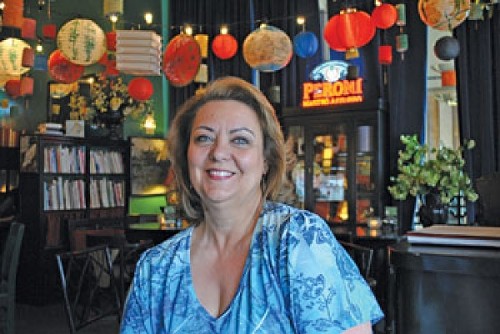LGBT Podcast: A Mom's View
Leesa Myers: Important to Share Stories
By Kolbie Stonehocker @vonstonehockerLeesa Myers is the mother of a gay son, and she writes about her experiences as a guest contributor for QSaltLake in a column called A Mom’s View. After receiving numerous letters from other parents and people in the LGBT community in response, she decided to create a BlogTalkRadio podcast called Mom’s View, as well as a website with resources for parents of gay children. The podcast will be a place for parents and their LGBT children to find support and hear the stories of other people in similar situations. Those interested in contributing to the launch of the podcast can donate at IndieGogo.com/MomsView.
What inspired you to create a podcast?
I’ve been writing the Mom’s View with QSalt Lake, [about how] my son is gay. I was getting different letters and people would talk to me about their experiences, whether they were gay or lesbian, or whether they were mothers. When my son came out, I had a friend who was gay, so I was able to ask him, “What does it mean to be gay? What did you go through?” And it really helped me. When people go to support groups, they identify with other people’s stories, which helps them. That’s what the podcast is about: parents telling their stories of when their children came out, and also the LGBT community sharing their stories. My son knew he was gay when he was 8 years old, but he didn’t tell me until after he left the house, and we have a great relationship. So, it’s like, why didn’t you feel safe to come out earlier? I think that [LGBT people] battle with their own issues, sometimes I think it’s, “As long as I don’t say it to my family, then I don’t have to claim it, that I’m gay, lesbian or transgender. Then I can fight the issues myself.”
When your son came out, how did you feel?
My son was pulling away from the family. He’d say, “I don’t feel like I’m part of the family.”
I finally said, “We need to have a talk; we need to find out what’s going on here.” His idea was he was just going to finish school, move out of the state, and just disappear. I said, “What is going on?” And he said, “I don’t know how to tell you this, but I’m gay.” And I said, “I’ve got gay friends, I know what gay is. It’s not a problem. The biggest fear that I have, as a mother, I need to say this: You’re among the highest group for suicide as well as HIV/AIDS. So, be careful, and let’s talk.” And talking with other mothers, they’ve come out with the same thing, that their biggest concerns were suicide.
How will you use your experiences to help people who are in a similar situation?
[Listeners] will be able to hear the stories, they’ll be able to identify and know that they’re not alone. Also, during each podcast, we’ll talk about the different resources [available]: Parents, Families & Friends of Lesbians & Gays (PFLAG), the Pride Center. [There will also be] a website that will have different places of resource, new things that are happening, new research. When your [child] tells you that they’re gay or lesbian or transgender, if you aren’t exposed to any of that, who do you talk to if you think, “My friends will reject me, or even my family, my husband”? It’s very easy to listen to stories.
What kinds of topics will be discussed on the podcast?
These podcasts will be, in essence, anonymous—maybe their first name.
Then that way, people will have the freedom and feel safe to really
share the truth. How old was your child when they came out or when they
told you, what were your first thoughts? And what were some of the
things that you did? Did you tell people? Were you comfortable with it?
If you’re comfortable with it, why were you comfortable? With myself, I
was exposed to a lot of friends who were gay, so I had no problem. But
if you’re in a very religious background that says that gays and
lesbians and transgender [people] are an abomination, what do you go
through when your religion and your child battle with each other? What
helped you to cope, what helped you to hold it together? When talking to the LGBT community, how old were you when you came out,
how did you feel, what things did you go through? How did your family
respond? Are you in touch with your family, have you thought of suicide?
What kept you from trying? What do you wish your parents would have
done?
What’s the most important thing parents can do to help their gay child?
Absolutely show that they love and accept them, and that there is nothing wrong with them. They are going through all the self-hatred, the self-loathing, the “Why is this me? Why am I being punished?” So what they need from their parents is [to hear] that that’s not who they are, that they are perfect, there’s nothing wrong with them.
Kolbie Stonehocker Twitter: @VonStonehocker
More by Kolbie Stonehocker
-
The Ladells
Forget the hammer: The Ladells are hitting listeners' ears with Vamp
- May 13, 2015
-
Triggers & Slips
Triggers & Slips ride the rails between music's past and present
- Apr 15, 2015
-
Folk Hogan
Folk Hogan tells the dark story of a fantastical circus in The Show
- Apr 8, 2015
- More »




